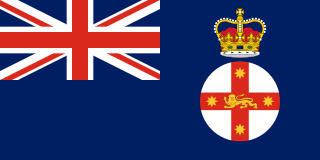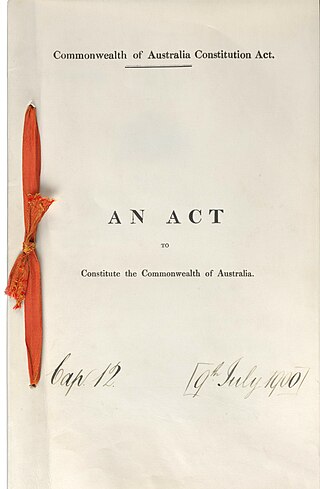
The Governor of New South Wales is the representative of the monarch, King Charles III, in the state of New South Wales. In an analogous way to the Governor-General of Australia at the national level, the Governors of the Australian States perform constitutional and ceremonial functions at the state level. The governor is appointed by the monarch on the advice of the Premier of New South Wales, and serves in office for an unfixed period of time—known as serving At His Majesty's pleasure—though five years is the general standard of office term. The current governor is retired judge Margaret Beazley, who succeeded David Hurley on 2 May 2019.

An oath of office is an oath or affirmation a person takes before assuming the duties of an office, usually a position in government or within a religious body, although such oaths are sometimes required of officers of other organizations. Such oaths are often required by the laws of the state, religious body, or other organization before the person may actually exercise the powers of the office or organization. It may be administered at an inauguration, coronation, enthronement, or other ceremony connected with the taking up of office itself, or it may be administered privately. In some cases it may be administered privately and then repeated during a public ceremony.

The Irish Oath of Allegiance was a controversial provision in the Anglo-Irish Treaty of 1921, which Irish TDs and Senators were required to swear before taking their seats in Dáil Éireann and Seanad Éireann before the Constitution Act 1933 was passed on 3 May 1933. The controversy surrounding the Oath was one of the principal issues that led to the Irish Civil War of 1922–23 between supporters and opponents of the Treaty.

An oath of allegiance is an oath whereby a subject or citizen acknowledges a duty of allegiance and swears loyalty to a monarch or a country. In modern republics, oaths are sworn to the country in general, or to the country's constitution. For example, officials in the United States, take an oath of office that includes swearing allegiance to the United States Constitution. However, typically in a constitutional monarchy, such as in the United Kingdom, Australia, and other Commonwealth realms, oaths are sworn to the monarch. Armed forces typically require a military oath.

The Canadian Oath of Allegiance is a promise or declaration of fealty to the Canadian monarch—as personification of the Canadian state and its authority, rather than as an individual person—taken, along with other specific oaths of office, by new occupants of various federal and provincial government offices; members of federal, provincial, and municipal police forces; members of the Canadian Armed Forces; and, in some provinces, all lawyers upon admission to the bar. The Oath of Allegiance also makes up the first portion of the Oath of Citizenship, the taking of which is a requirement of obtaining Canadian nationality.
An oath of citizenship is an oath taken by immigrants that officially naturalizes immigrants into citizens. It is often the final step in this process, and is usually done in a ceremonial capacity. An oath of citizenship is designed to be a statement of patriotism and loyalty to the new country. In countries which retain a monarchical system of government, an oath of allegiance to the monarch is often required as well. Adding an oath to God to the end of an oath is usually optional.
The Government of New South Wales, also known as the NSW Government, is the governing body of New South Wales, Australia. The executive government comprises 11 portfolios, led by a ministerial department and supported by several agencies. There are also a number of independent agencies that fall under a portfolio but remain at arms-length for political reasons, such as the Independent Commission Against Corruption and Electoral Commission. The state Executive Council, consisting of the governor and senior ministers, exercises the executive authority through the relevant portfolio.

The Parliament of New South Wales, formally the Legislature of New South Wales, is the bicameral legislative body of the Australian state of New South Wales (NSW). It consists of the monarch, the New South Wales Legislative Assembly and the New South Wales Legislative Council. Each house is directly elected by the people of New South Wales at elections held approximately every four years. The legislative authority of the parliament derives from section 5 of the Constitution Act 1902 (NSW). The power to make laws that apply to New South Wales is shared with the Federal Parliament. The houses of the New South Wales Parliament follow the Westminster parliamentary traditions of dress, green–red chamber colours and protocols. The houses of the legislature are located in Parliament House on Macquarie Street, Sydney.

The Oath of Allegiance is a promise to be loyal to the British monarch, and their heirs and successors, sworn by certain public servants in the United Kingdom, and also by newly naturalised subjects in citizenship ceremonies. The current standard wording of the oath of allegiance is set out in the Promissory Oaths Act 1868.

The Oath of Citizenship, or Citizenship Oath, is a statement recited and signed by those who apply to become citizens of Canada. Administered at a ceremony presided over by a designated official, the oath is a promise or declaration of fealty to the Canadian monarch and a promise to abide by Canada's laws and uphold the duties of a Canadian citizen; upon signing the oath, citizenship is granted to the applicant.

Demise of the Crown is the legal term in the United Kingdom and the other Commonwealth realms for the transfer of the Crown upon the death or abdication of the monarch. The Crown transfers automatically to the monarch's heir. The concept evolved in the kingdom of England, and was continued in Great Britain and then the United Kingdom. The concept also became part of the constitutions of the British colonies, and was continued in the constitutions of the Commonwealth realms, until modified within those realms.
The New Zealand Oath of Allegiance is defined by the Oaths and Declarations Act 1957. The Oath is required under New Zealand law to be made in certain circumstances, including as a requirement for individuals to hold certain offices, as well in judicial proceedings.

The monarchy of Jamaica is a system of government in which a hereditary monarch is the sovereign and head of state of Jamaica. The current Jamaican monarch and head of state, since 8 September 2022, is King Charles III. As sovereign, he is the personal embodiment of the Jamaican Crown. Although the person of the sovereign is equally shared with 14 other independent countries within the Commonwealth of Nations, each country's monarchy is separate and legally distinct. As a result, the current monarch is officially titled King of Jamaica and, in this capacity, he and other members of the royal family undertake public and private functions domestically and abroad as representatives of the Jamaican state. However, the monarch is the only member of the royal family with any constitutional role.
In Australia, an Oath of Allegiance or an Affirmation of Allegiance are oaths of allegiance required to be made to the monarch of Australia in some situations. Oaths of Allegiance are usually made on a Bible, or some other book holy to the person, such as a Torah or Quran; but the person may opt to make an affirmation in lieu of an oath. This oath is not the same as the Australian Citizenship Pledge which is required to be made when being naturalised as an Australian citizen.

The monarchy of the Bahamas is a system of government in which a hereditary monarch is the sovereign and head of state of the Commonwealth of The Bahamas. The current Bahamian monarch and head of state, since 8 September 2022, is King Charles III. As sovereign, he is the personal embodiment of the Bahamian Crown. Although the person of the sovereign is equally shared with 14 other independent countries within the Commonwealth of Nations, each country's monarchy is separate and legally distinct. As a result, the current monarch is officially titled King of the Bahamas and, in this capacity, he and other members of the royal family undertake public and private functions domestically and abroad as representatives of the Bahamian state. However, the King is the only member of the Royal Family with any constitutional role.
The Executive Council of New South Wales is the cabinet of that Australian state, consisting of the Ministers, presided over by the governor.

The Constitution of Australia is the fundamental law that governs the political structure of Australia. It is a written constitution, that establishes the country as a federation under a constitutional monarchy governed with a parliamentary system. Its eight chapters sets down the structure and powers of the three constituent parts of the federal level of government: the Parliament, the Executive Government and the Judicature.

The Constitution of New South Wales is composed of both unwritten and written elements that set out the structure of Government in the State of New South Wales. While the most important parts are codified in the Constitution Act 1902, major parts of the broader constitution can also be found in:
The Public Offices Ordinance 2021 is an ordinance to amend the Oaths and Declarations Ordinance and other relating legislation which adds new requirements for the Chief Executive, Executive Council members, Legislative Council members and judges and other judicial officers, imposes oath-taking requirements on District Council members, and specifies requirements for candidates to swear to uphold the Basic Law and bear allegiance to the Hong Kong Special Administrative Region when assuming office or standing for election and also adds new grounds and mechanism for disqualification from holding the office or being nominated as a candidate. The ordinance was seen as another round of the Beijing authorities to bar the opposition from standing in elections or holding public offices and also raised concerns on the bill's vague parameters of the oath with such over-reaching scope would undermine Hong Kong's judicial independence.

Section 128 of the Constitution Act, 1867 is a provision of the Constitution of Canada relating to the oath of allegiance for members of the Senate and the House of Commons of Canada, as well as members of the provincial legislative assemblies. The section also requires members of the Senate to make a declaration of qualification. The texts of the oath and the declaration of qualification are set out in the Fifth Schedule of the Act. The section also applied to members of the provincial legislative councils, but since they have all been abolished, it no longer has any application in that regard.












